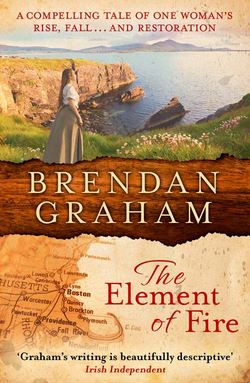Читать книгу The Element of Fire - Brendan Graham - Страница 10
4
ОглавлениеThe days dragged by. Each day she trudged with the children to the quayside and scanned out along Clew Bay for the tell-tale line against the sky. Each day they returned dispirited, almost as much by what they had witnessed on the way, as by the lack of a ship. Was there to be no let up in the calamity? The scenes of despair and deprivation seemed to her to have worsened. Droop-limbed skeletons of men – and women – hauled turf on their backs through the streets, once work only for beasts of burden. When she mentioned this at The Inn, they laughed at her naïveté.
‘There’s not an ass left in Westport that hasn’t been first flayed for the eightpence its pelt will bring, then its hindquarters eaten,’ a well-cushioned jobber jibed. ‘Now the peasants who sold them have to make asses of themselves!’
She was shocked at the indifference of the commercial classes to the plight of ‘the peasants’.
Nervous of everything, she kept the children close by and was cross with them if they wandered, terrified that she’d lose them. That they’d be swallowed in the hordes of the famished who filled the streets with the smell of death and the excrement of bodies forced to feed inwardly upon themselves.
Once she traipsed them with her to Croagh Patrick. They climbed to where they could look across the dotted archipelago of the bay, out past the Clare Island lighthouse. She could see no tall ships, only boats far out, maybe tobacco smugglers, or those ferrying the contraband Geneva, an alcoholic liquor flavoured with juniper and available from under the counter – if asked for – at The Inn.
They climbed higher for better vantage, Ellen straining her eyes against the gold and green of sun and sea. Here, on this age-old mountain, St Patrick had fasted for forty days and forty nights. ‘Those who worship the Sun shall go in misery … but we who worship Christ, the true Sun, will never perish.’ In the writing of his Confession the saint had denounced the sun and its worshippers. Now she prayed to the sun to bring them a ship. Sun-up or sun-down, it didn’t matter, as long as it came. To the west her eye caught a rib of white stone rising heavenwards against the bulk of the mountain. A ‘Famine wall’ going nowhere, built on the Relief Works to exact moral recompense from the starving stone-carriers. They in turn given ‘relief’; a few pence in pay, a handful of soup-tickets.
She remembered how on the last Sunday of summer, Reek Sunday, as it was widely known, the Clogdubh – the Black Bell of St Patrick – was brought there for weary pilgrims to kiss, for a penny. Black from the holy man pelting it at devils, they said. She had never kissed it. For tuppence, those afflicted with rheumatism might pass it three times around the body, for relief. Another superstition of the shackling kind that bred paupers to pay priests. Like the legends about the reek itself. Legends, she guessed, grown to feed misery and repentance, to keep the people out of the sun.
She thought of ascending the whole way – making the old pilgrimage, beseeching the high place where the tip of the mountain disappeared into the lower heavens, to send a ship. But what was it, anyway? Only a heap of piled-up rocks, only a mountain. And what could a mountain do? Still, she called the children and followed the path to the First Station. Seven times they shambled around the cairn of stones intoning seven Our Fathers, seven Hail Marys and one Creed. She wondered why once of everything wasn’t enough, why it had to be seven times.
Then she turned her back on St Patrick’s mountain, angry, yet disquieted by her rejection of it, and dragged them down the miles with her to Westport. Westport, relic of the anglicization of Ireland. A Plantation town of well-mannered malls, the canalized Carrowbeg outpouring the grief and suffering of its hapless inhabitants.
St Patrick and the Protestant Planters could have it between them.
